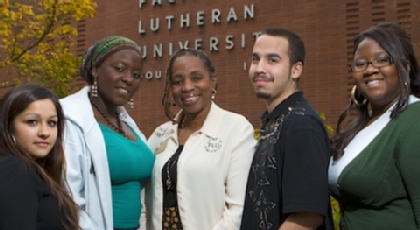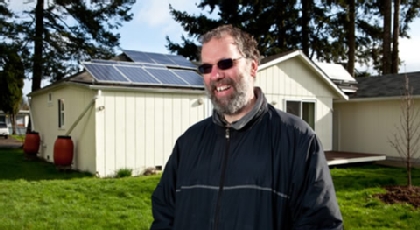Page 402 • (4,879 results in 0.055 seconds)
-

draw upon? Possible Collaboration PartnersTake a look at the different centers across campus and the work they do to see who you may be able to collaborate with: Center for Diversity, Justice, and Sustainability: The Center for DJS works with students, faculty, staff, alumni, and community members to imagine and create equitable and thriving communities, and offer a network of advocacy resources. Contact: dcenter@plu.edu or 253-535-8750. Wang Center for Global and Community Engaged Education
-

and study away programs, our students enrich their perspectives and problem solving abilities. Some of our graduates have gone to work at Boeing, Seattle Kraken, Tacoma Police Department and Sound Credit Union, from CEO of a major airline to impactful roles in non-profit companies such as United Way. They excel in diverse organizational levels and types of industries. PLU’s business major takes you on a transformative journey where the fusion of business education and experiential learning will
-
Placement (AP) Students who have completed advanced placement tests with appropriate scores receive credit. Credit is awarded only for scores of 3, 4 or 5. Credit is applied to specific General Education Requirements or elective credit depending on the test category and score. See the AP Course Policy chart here or scroll down to see credit awarded for each AP test. If you have tested for an AP class that is not listed, the PLU Registrar’s Office will review the course individually.International
-
preparation will be evaluated holistically by the program admission team with consideration given to the applicant’s previous formal education and relevant professional certifications or experience. Students may be given conditional admission based on gaps in previous knowledge. Conditional admission may require the completion of necessary prerequisite coursework prior to the start of the program. To be eligible for admission applicants must hold a bachelor’s degree from a regionally accredited
-

. I’ve taken numerous studio workshops too as continuing education! I think it’s super important to be a lifelong learner, and taking classes makes me remember what it’s like to be a student. Why did you decide to study art? What sparked your interest in art and how did your academic path and career develop from there? I come from a family of artists, makers, and crafters. My first job as an artist was when I was five years old and I painted trees in the background of my grandfather’s landscape
-

. “The awarding of this scholarship to Isaiah, one of only three recipients nationally, is a testament to what an outstanding person he is and to the strength of the pre-health sciences, natural sciences, and liberal arts education Isaiah received at PLU. He was an amazing student who exemplified the very best of PLU, ” said Auman. PLU News had the opportunity to meet with Banken to dive deeper into his experiences and discuss his passions and ambitions. Tell us a little bit about you and your
-
April 25, 2008 AAUP president discusses faculty leadership Campus Voice spoke with Cary Nelson, president of the American Association of University Professors, prior to his campus address in April. The interview has been edited for length. Campus Voice: What is the role of the president of the American Association of University Professors? Cary Nelson: First of all it is to be a spokesperson for the organization. I’d been writing about higher education policies for about 20 years before I
-
emphasizes, above all, listening and dialogue. – Carmiña Palerm Carmiña Palerm’s is an assistant professor of Spanish at PLU. PART TWO Pacific Lutheran University encourages its students to become global citizens, priding itself on offering a global education with programs on all seven continents. In its most honorable presentation, this international perspective inspires students to think beyond themselves as Americans, to look at how the American way of life impacts other cultures and countries. In its
-

Nordquist’s history of PLU, “Education for Service, Pacific Lutheran University, 1890-1990,” the university was a “showcase institution” in the handling of global studies, as determined by to the U.S. Office of Education. PLU professors soon began traveling to China to teach and, students were starting to study abroad. By 1988, 6 percent of the student population had citizenship of someplace other than the United States. In the following years, that percentage has not changed much. Today, that percentage
-

institution, not its mission for sustainable living. Tegels said everyone still has a long way to go before reaching a perfectly green lifestyle, but he said the goal that PLU has for a healthier planet is the first step. “It’s very much the mindset of the individual that will determine where we go with all of this,” Tegels said. “Education and honest education is a crucial factor in that.” Read Previous Lute reaches for the stars Read Next Learning from the floor COMMENTS*Note: All comments are moderated
Do you have any feedback for us? If so, feel free to use our Feedback Form.


